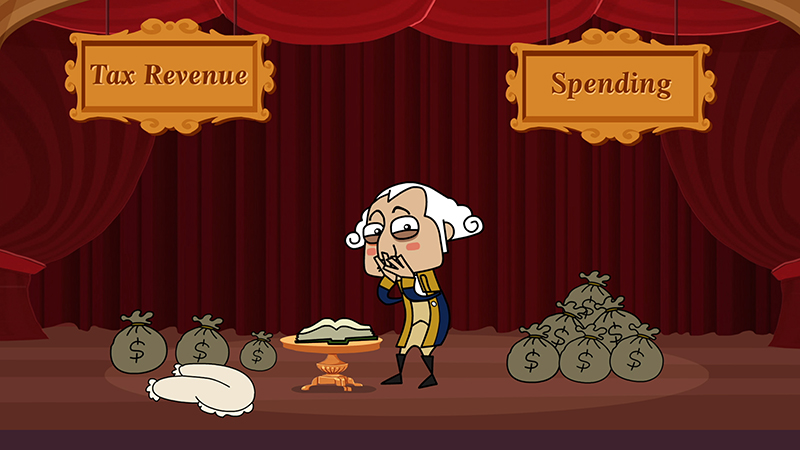Thinking back to elementary school, the idea of going to vote or paying taxes just seemed so adult, and so far away.
Yet, here we are, all those years later. Election Day is quickly approaching and taxes and other financial concerns always seem to be on our minds. Welcome to being a grown up.
Before you exercise your right to vote on November 4 — and before you file your tax return in April — take a moment to take a trip back to the (virtual) classroom to get the full picture of why and how the U.S. government spends your money. It’s a trip that four award-winning filmmakers were eager to take with new short films for WE THE ECONOMY.
“So often we watch our elected officials spar over spending and cuts, but when we put them into context within the overall budget, it becomes clear they are arguing about pennies as opposed to dollars,” said Barbara Kopple, director of “Your Tax Dollars at Work”. “It was important to me that people understand that while the spending itself may be insignificant in the grand scheme, the impact is often very significant to countless Americans.”
 Two-time Academy Award-winner Barbara Kopple goes on a journey to find out how the government spends American tax dollars.
Two-time Academy Award-winner Barbara Kopple goes on a journey to find out how the government spends American tax dollars.
WE THE ECONOMY is a new short film series from Paul G. Allen’s Vulcan Productions and Morgan Spurlock’s Cinelan that brings together film and economics in ways never before seen. The films can all be viewed for free on wetheeconomy.com, via the iPhone or Android app or on one of more than 50 distribution partners’ destinations. The films are the result of 10 economic experts and 20 filmmakers collaborating to address important questions about the U.S. economy that we should all know how to answer.
Take for instance, how do the budget deficit and national debt differ? These are two concepts politicians often confuse, and a topic that director Marshall Curry explored in an unexpected way.
“I wanted to make a documentary, but knew that there was only one thing more boring to most people than the words ‘debt and deficit,’ and that was the word ‘documentary,’” said Curry. “And then my nine-year-old daughter said, ‘Maybe you should do it as a cartoon. Everything’s fun when it’s a cartoon!’”
So he made a cartoon. Watch his “Amazing Animated Film on the Debt and the Deficit,” and see how politicians have used these terms going all the way back to our Founding Fathers.
Taxes, too, have always been part of the American political landscape. Yet, for many, including filmmaker Jessica Yu, our tax system is often seen more of a “national headache” than an important revenue source for the government. Like her fellow WE THE ECONOMY director Curry, Yu turned to animation to cover the origins and complexities of the 75,000-page U.S. tax code in “Taxation Nation”.
 It’s not a new “Schoolhouse Rock,” it’s an animated short from Jessica Yu that addresses why the U.S. tax system is so complicated.
It’s not a new “Schoolhouse Rock,” it’s an animated short from Jessica Yu that addresses why the U.S. tax system is so complicated.
“We had a blast creating an animated musical that had our characters navigating the ever-changing ‘tax highway.’ Our goal was to make the refrain as stick-in-your-head as any Schoolhouse [Rock] tune,” said Yu.
Directors Heidi Ewing and Rachel Grady also took inspiration from their education and learning experiences to address an issue that represents just one percent of the U.S. budget but is often on the front page of newspapers: foreign aid. Instead of looking at the big $37 billion budget figure, however, Ewing and Grady’s “The Foreign Aid Paradox” zeroes in on food aid to Haiti, and its effects on American farming and shipping interests, as well as Haiti’s own agricultural markets.
 The U.S. spends billions every year on foreign aid, but where does it go? Documentarians Rachel Grady and Heidi Ewing ask that question in a new short.
The U.S. spends billions every year on foreign aid, but where does it go? Documentarians Rachel Grady and Heidi Ewing ask that question in a new short.
“My approach with this film is a civilian one,” said Ewing. “Rather than relying on aid workers and buttoned-up government officials, I decided to focus primarily on regular people to help me connect the dots on the vagaries of food aid to Haiti, all who (knowingly or not) are very much affected by complicated aid policies made in the U.S.”
Just a few things to think about this election season. Watch all the films and join the conversation online at www.wetheeconomy.com.
COVER PHOTO: The U.S. has a long history with budget deficits and national debt, as Marshall Curry’s animated short explores.






